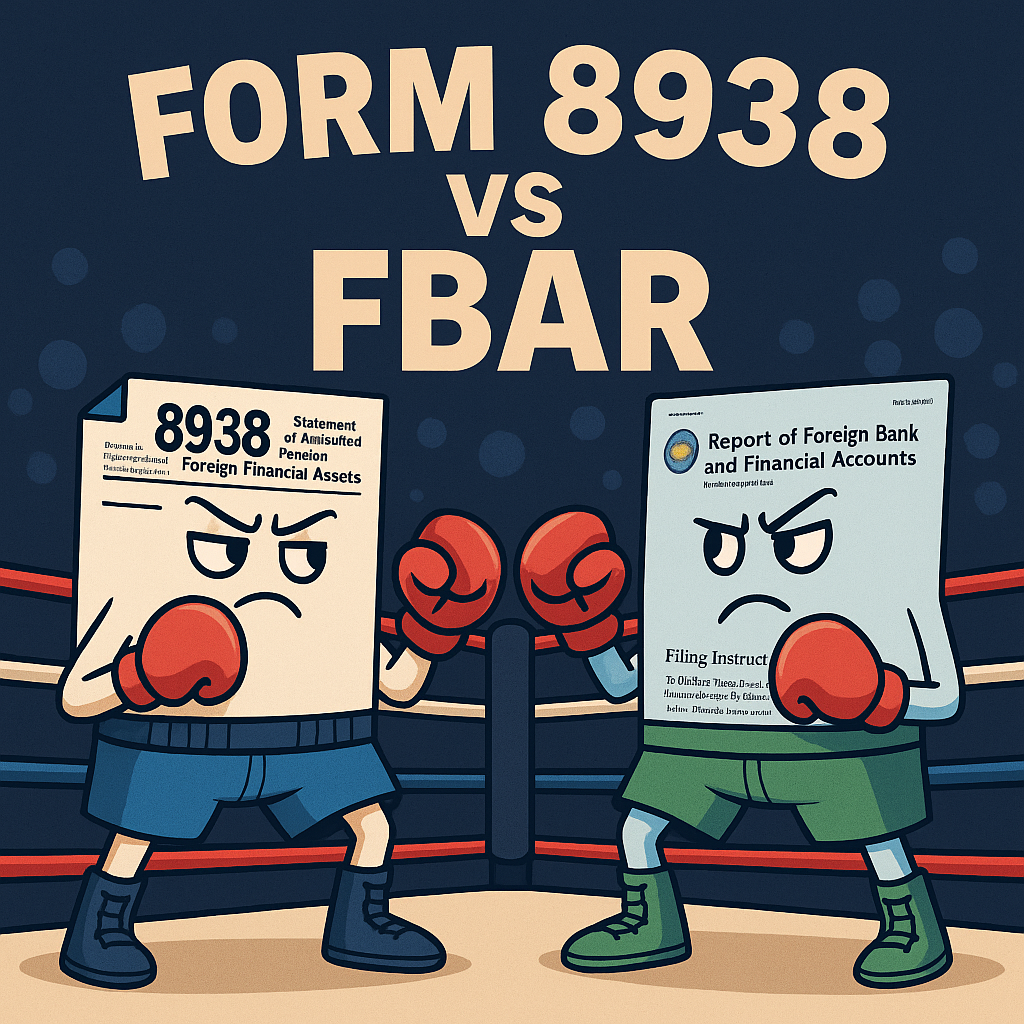Understanding IRS Form 8938 vs. FBAR — What’s the Difference?
In today’s increasingly globalized world, more U.S. taxpayers find themselves holding financial interests or authority over foreign financial assets. The U.S. Internal Revenue Service (IRS) has specific reporting requirements aimed at capturing this offshore financial activity to prevent tax evasion and promote transparency. Two of the most commonly discussed and mandated forms for reporting such foreign financial interests are IRS Form 8938, known as the Statement of Specified Foreign Financial Assets, and the FBAR, or Report of Foreign Bank and Financial Accounts, officially FinCEN Form 114. Though similar, each of these forms has distinct purposes, scopes, and filing requirements. In this comprehensive article, we will dive deep into the differences between IRS Form 8938 and FBAR, when each is required, the implications of failing to comply, and practical guidance on navigating these essential tax obligations.
What is the FBAR?
The FBAR, or Report of Foreign Bank and Financial Accounts, is a form required to be filed by U.S. persons who have a financial interest in or signature authority over foreign financial accounts exceeding $10,000 at any point during the calendar year. The FBAR must be filed electronically with the Financial Crimes Enforcement Network (FinCEN), rather than the IRS. The form’s primary purpose is to report foreign bank accounts, securities accounts, mutual funds, and other types of foreign financial accounts to help combat tax evasion and money laundering.
What is IRS Form 8938?
IRS Form 8938, Statement of Specified Foreign Financial Assets, was introduced as part of the Foreign Account Tax Compliance Act (FATCA) and is a tax form filed with your annual income tax return (Form 1040). It requires certain U.S. taxpayers to report ownership of specified foreign financial assets if the total value of those assets exceeds certain thresholds. Unlike the FBAR, Form 8938 covers a broader range of foreign financial assets, including foreign stocks, bonds, partnership interests, and other financial instruments held outside the United States.
Key Differences Between FBAR and IRS Form 8938
- Filing Authority: FBAR is filed electronically with FinCEN, a bureau of the U.S. Department of Treasury, whereas Form 8938 is filed with the IRS as part of your income tax return.
- Reporting Thresholds: The FBAR filing threshold is $10,000 aggregated across all foreign financial accounts at any time during the year. Form 8938 thresholds vary depending on filing status and residency, ranging from $50,000 to $600,000 on the last day of the tax year or at any time during the year.
- Scope of Assets Reported: FBAR focuses strictly on foreign financial accounts, including bank accounts, securities accounts, and mutual funds. Form 8938 includes those same accounts plus other foreign financial assets like stock, securities, partnership interests, and other non-account investments.
- Forms and Filing Deadlines: FBAR must be filed separately by April 15 with an automatic extension to October 15 if missed. Form 8938 must be filed with the annual income tax return by the tax deadline (including extensions).
- Penalties for Noncompliance: Both have severe penalties for failure to file. The FBAR penalty can be up to $12,921 per violation for non-willful failures and up to $129,210 or more for willful violations. Form 8938 has a minimum penalty of $10,000, with additional penalties up to $50,000 for continued failure after IRS notification.
Who Must File FBAR?
Any U.S. person — including U.S. citizens, residents, trusts, estates, and domestic entities — must file the FBAR if they have a financial interest in or signature authority over foreign financial accounts with an aggregate value exceeding $10,000 at any time during the calendar year. This includes bank accounts, brokerage accounts, mutual funds, and other types of foreign financial accounts.
Who Must File Form 8938?
Form 8938 filing requirements apply primarily to specified individuals, which include U.S. citizens, resident aliens, and certain non-resident aliens who file U.S. income tax returns. The filing thresholds depend on the taxpayer’s filing status and where they reside:
- Unmarried taxpayers living in the U.S. must file if the total value of specified foreign financial assets is $50,000 or more on the last day of the tax year or $75,000 or more at any point during the tax year.
- Married taxpayers filing jointly residing in the U.S. must file if thresholds exceed $100,000 on the last day of the tax year or $150,000 at any time during the year.
- The thresholds for taxpayers living abroad are higher, at $200,000 and $300,000 respectively.
Importantly, Form 8938 covers a broad range of foreign assets beyond financial accounts, including foreign stock not held in a financial account, interests in foreign entities, and more.
Examples of Foreign Financial Assets Covered
While FBAR targets accounts, Form 8938 includes accounts and other assets. Examples of assets reported on Form 8938 include:
- Bank accounts held abroad;
- Foreign stocks or securities;
- Foreign partnership interests;
- Foreign mutual funds and hedge funds;
- Foreign-issued life insurance or annuity contracts with cash value;
- Any financial instrument or contract with foreign issuer.
FBAR focuses on foreign financial accounts exceeding $10,000 but does not include physical assets like real estate.
How to File FBAR
The FBAR must be filed electronically using the FinCEN BSA E-Filing System. It is not filed with your regular IRS income tax return but separately with FinCEN. For the 2025 tax year, the FBAR deadline is April 15, 2026, with an automatic extension to October 15, 2026.
How to File Form 8938
Form 8938 must be attached to your annual income tax return (Form 1040). It is completed as part of your tax filing process with the IRS by the tax deadline, April 15 (with extensions available). It requires detailed reporting of specified foreign financial assets, including maximum values during the year, income generated, and asset types.
Why Are Both Forms Required?
It is vital to understand that the FBAR and Form 8938 are two complementary, not overlapping, reporting requirements. Many taxpayers are required to file both if their financial activities meet thresholds under each form. This dual reporting is because the two forms are submitted to different agencies and cover different scopes of financial interests.
Failing to file either form can result in significant penalties. For example, failing to report on the FBAR can trigger civil penalties starting at $10,000 for non-willful violations, escalating dramatically for willful violations. Similarly, failure to file Form 8938 can result in a minimum penalty of $10,000, and an additional $50,000 if the failure persists after IRS notification. Therefore, compliance is essential for avoiding hefty fines and possible criminal liability.
Common Misconceptions About FBAR and Form 8938
- Many taxpayers assume that filing one form suffices for reporting foreign assets; however, both forms may be required.
- Some believe only financial accounts must be reported, overlooking other assets like foreign stocks and securities that Form 8938 covers.
- Others incorrectly think the filing thresholds are identical for both forms, but each form has unique thresholds and reporting rules.
- Many are unaware that FBAR and Form 8938 are filed with separate agencies and on different schedules.
How to Avoid Penalties and Stay Compliant
To avoid penalties and ensure compliance with U.S. tax reporting requirements, taxpayers should:
- Maintain detailed records of all foreign financial accounts and assets, including account numbers, maximum values, and income generated.
- Determine if the aggregate value of foreign financial accounts exceeds $10,000 in any year, which triggers FBAR filing obligations.
- Assess whether the specified foreign financial assets meet or exceed Form 8938 thresholds based on filing status and residency.
- File FBAR electronically with FinCEN by the regulated deadlines, and attach Form 8938 to your annual tax return.
- Seek professional tax advice or legal assistance to navigate complex foreign asset reporting laws and avoid inadvertent filing errors.
Practical Scenarios Illustrating the Differences
Consider the following examples to clarify when and why taxpayers must file either or both forms:
- A U.S. citizen has a foreign bank account that reached a balance of $15,000 during the year but owns no other foreign assets. The taxpayer must file an FBAR due to the account balance exceeding $10,000 but may not need to file Form 8938 if other asset thresholds are not met.
- Another taxpayer owns foreign mutual funds and foreign stocks held in a brokerage account in the U.S. and a foreign bank account totaling $9,000. Even though the bank account balance is below the FBAR filing threshold, the total value of specified foreign assets may trigger Form 8938 reporting.
- A married couple living abroad owns multiple foreign assets worth over $250,000 but no individual foreign financial accounts exceed $10,000. They must file Form 8938 but may not need to file FBAR.
Filing Deadlines and Extensions for 2025
For the tax year 2025, the following key deadlines apply:
- FBAR is due by April 15, 2026, with an automatic extension to October 15, 2026.
- Form 8938 is due with your 2025 federal income tax return, normally April 15, 2026, including extensions if you file for them.
Taxpayers must be diligent about these deadlines to avoid late filing penalties.
Seeking Professional Assistance
Given the complexity of foreign financial asset reporting requirements and the severe penalties for noncompliance, it is highly advisable to seek professional legal or tax assistance. Tax professionals specializing in international tax law can help identify filing obligations, prepare accurate reports, and ensure compliance with FBAR and Form 8938 requirements. At Legal Marketplace CONSULTANT, we provide expert guidance tailored to your specific financial and tax situation.
If you are unsure whether you need to file FBAR or Form 8938 or desire comprehensive assistance with your foreign asset reporting, please contact us through the communications links in our bio or send a private message to schedule a consultation.
Legal Marketplace CONSULTANT — a trusted legal company specializing in full and comprehensive legal support for businesses and individuals. Our activities are based primarily on the specialization of our team, which includes lawyers, counsels, tax consultants, auditors, and accountants. To strengthen our team, we offer expert consultancy to help you navigate IRS foreign reporting requirements with confidence.
Understanding the differences between IRS Form 8938 and FBAR is crucial for every U.S. taxpayer with foreign financial interests. Both forms have specific filing requirements, reporting scopes, and penalties for non-compliance. While FBAR focuses on foreign financial accounts exceeding $10,000, Form 8938 covers a broader range of foreign financial assets and has different filing thresholds. Filing both forms when required helps avoid severe monetary penalties and legal risks. Maintaining accurate records, evaluating your foreign asset portfolio, and timely filing are essential steps to meet these compliance obligations. When in doubt, professional legal and tax assistance from specialists like Legal Marketplace CONSULTANT can provide personalized guidance and peace of mind as you fulfill your international tax reporting duties in 2025 and beyond.
If you have any questions or require dedicated support with FBAR and Form 8938 filing, do not hesitate to contact us through our bio or send a private message. Our expert team will gladly assist you in every step of the process.































